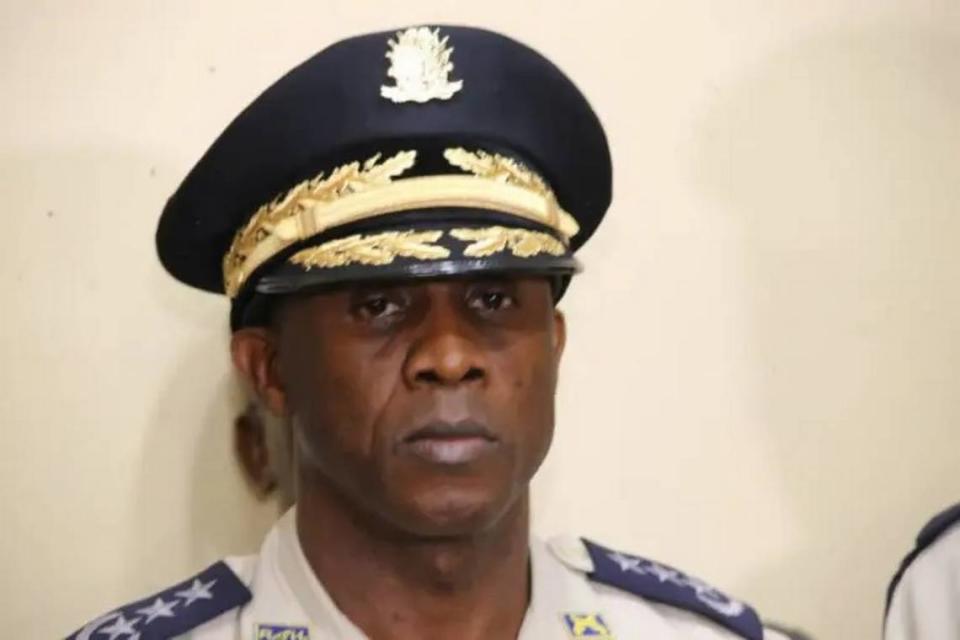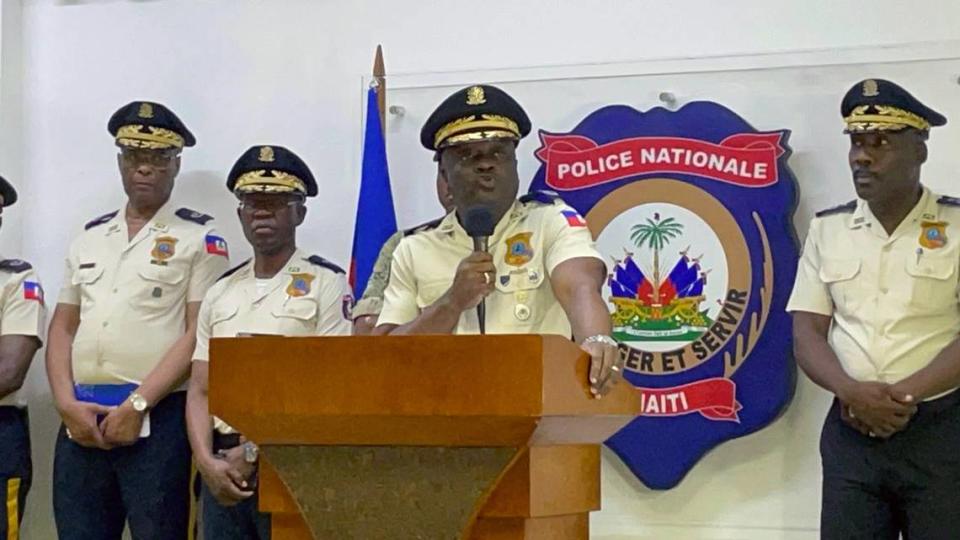Once ousted as Haiti’s police chief for failing to control gangs, he’s now back in top job
A former national police chief who was fired over his inability to stem the tide of armed gang violence gripping Haiti has once again been tapped to lead the country’s beleaguered police force.
Rameau Normil had served as acting director of the Haiti National Police for 15 months before he was fired by former President Jovenel Moïse in November 2020. Late Wednesday, he was officially named back to his old job by the country’s new transitional government. Normil replaces Frantz Elbé, the embattled police director whose ouster had been demanded by human-rights advocates and others over criticism he wasn’t doing enough to protect the public or police against gangs.
“We believe the moment has arrived for us to give the police a new breath, a new energy to reconcile the police and the population,” the newly selected prime minister, Garry Conille, said Thursday.
The decision to change the police’s leadership, he said, was made with members of the transitional presidential council. Conille said the council has yet to discuss with Normil — who until recently had been assigned to Haiti’s embassy in Washington, D.C. — how to tackle the country’s worsening violence, but that it will happen soon.
Normil’s swearing-in ceremony, scheduled for Thursday, was postponed until 10 a.m. Friday.
“The police needed a change in leadership,” said Pierre Esperance, the head of the National Human Rights Defense Network and one of Elbé’s staunchest critics.

Esperance said he thinks that Normil did a good job when he oversaw the country’s Central Directorate of the Judicial Police unit before being tapped as top cop in 2019, but “his work as director of the Haiti National Police under Jovenel Moïse did not produce results.”
The first time Normil was police chief, the last of the United Nations peacekeeping troops sent in after the deadly earthquake in 2010 had just left. Under Normil, the police struggled to restore calm to Haiti. Growing discontent led to chaos on the streets of Port-au-Prince as rogue cops carried out violent attacks and protests. In one infamous incident, police and members of the Haitian military engaged in a violent confrontation that left at least two dead and a dozen others injured.
The country saw a rise in gang-orchestrated kidnappings, massacres and high-profile assassinations, some of which implicated police officers. Unable to rein in the growing terror, Normil also came under fire for failing to arrest Jimmy “Barbecue” Chérizier, then a rising gang leader who was accused of carrying out a gruesome massacre in Port-au-Prince’s La Saline neighborhood.
At the time of Normil’s dismissal, the prime minister at the time, Joseph Jouthe, accused him finding “pretexts to explain his lack of results.”
Eve of Kenya’s arrival
The latest change in leadership at the helm of the Haiti National police comes as a new transition government takes charge in the midst of a wave of deadly gang violence that has already killed or injured more than 2,500 people this year, and uprooted more than 100,000 from their homes. It also comes as the United States and Kenya finalize preparations for the arrival of a Multinational Security Support mission to help the Haitian police stabilize the troubled country and pave the way for elections.
So far seven nations, including Kenya, have notified the U.N. they will field officers for the security mission, which was approved by the Security Council in October but has faced repeated legal and financial delays. A U.N. trust fund for the force has only $21 million so far, and has made one disbursement of $1.2 million to reimburse training costs for the first group of Kenyan police officers. Though the deployment date remains a tightly guarded secret, a State Department spokesperson said that a base for the officers to work from “is now ready.”
Conille, the prime minister, said Thursday that while Kenyan President William Ruto recently reiterated his commitment to helping Haiti, it “is our responsibility” to take the country back from the gangs.
“We have the means and we have the capacity, and we have the knowledge,” he said. “Others are coming to help us, they are coming to support us, they are coming to accompany us, but reestablishing security is our responsibility.”
He added he doesn’t want Haitians to think that the effort to bring peace to the country is being left “to an entity other than us.”
On Tuesday, a senior State Department official told the Miami Herald that, following months of refusal by senior Republican lawmakers to lift a hold on a funding request, Secretary of State Antony Blinken authorized $109 million to get the multinational mission off the ground. On Friday, the U.N. Security Council has scheduled a. briefing for an update on where the deployment stands.
In his new role as national police chief, Normil will not only need to work with the multinational force — most of whom do not speak French or Haitian Creole — he will find himself confronting even more challenging issues than he did the first time he held the post.
Armed gangs control more than 80% of the capital and are expanding outside Port-au-Prince. Since Feb. 29, armed groups have been targeting cops more and more.

A report published by the National Human Rights Defense Network last week said that 323 police officers have been killed since 2015. Between October 2021 and Wednesday, when Elbé officially informed his officers of his departure and his successor’s arrival, Haiti logged 120 police deaths, including 20 since January, the group said.
The report also said that of the 68 armed gang attacks since January 2021 against police stations, sub-stations, prisons and specialized units, 55 of them occurred during Elbé’s leadership.
Earlier this month, after three officers were ambushed in their armored vehicles and killed in a deadly gang attack, members of the transitional presidential council expressed their determination to reinforce the operational capacity of the police and offered condolences to the cops’ families. Conille also expressed outrage and sadness over what he described as the “heinous and barbaric act,” and promised peace would return to Haiti.
As images of the police officers’ charred and mutilated bodies were shared on social media, Chérizier, the former police officer turned gang leader, claimed responsibility for the attack. In a widely circulated video, he brandished seized weapons and warned that the June 9 attack near Delmas 18 was “a warm up” of what’s to come. The attack, which also led to another officer being injured, occurred during a clash between members of Chérizier’s newly created Viv Ansanm gang alliance and the police’s specialized Anti-Gang Tactical Unit that Elbé created to help fight the gangs.
Not first time a fired top cop returns
This is not the first time Haiti has brought back a fired cop to lead its struggling force. After Normil was ousted in 2020, Moïse appointed Léon Charles, who had headed the national police in 2004 before he was pushed out amid concerns by the international community over his commitment to cleaning up the force.
At the time Charles was named to the top job in 2020 he had spent 15 years out of the force. As head of the national police he faced criticism over his failure to thwart Moïse’s assassination and guarantee the safety of Prime Minister Ariel Henry. Charles later resigned after being indicted by a Haitian judge in Moïse’s July 7, 2021, assassination, telling the Miami Herald he needed to be free to defend himself.
Normil will find a national police force in disarray. The survey by the National Human Rights group said that 95% of officers it polled describe their general working conditions “as a source of great frustration.” The survey of 132 police officers was conducted between May 6 and 27 of this year. Officers were questioned about their working conditions, training, equipment and whether they felt safe.
The survey found that officers are subjected to unsanitary stations, demanding and difficult hours, insufficient and irregular salaries and insufficient training. After being trained at the National Police Academy, where officers say they were given worn and mostly unusable uniforms, boots and a firearm, 35% of those surveyed said had no access to further training.
The survey also found that 33% of the police officers had been victims of gunshot wounds, stabbings and other attacks.

Earlier this week the National Police Academy hosted the graduation of 455 newly trained specialized police officers, including some benefiting from U.S. training.
Among those who attended the event alongside Conille and members of the transitional presidential council was Dennis Hankins, the recently appointed U.S. ambassador to Haiti. Hankins’ presence marked the first time in three years that a U.S. ambassador had visited the academy, which had become no-go zone despite its close proximity to the U.S. Embassy because of repeated attacks from gangs.

